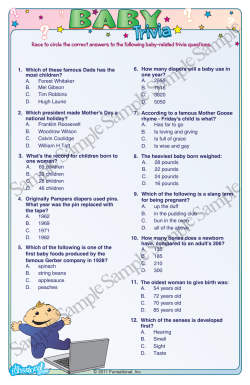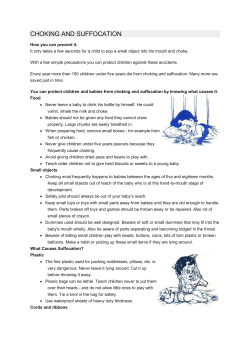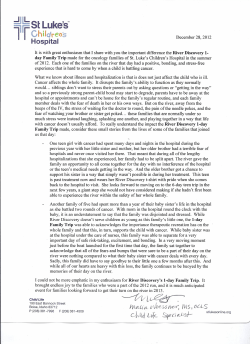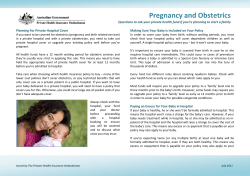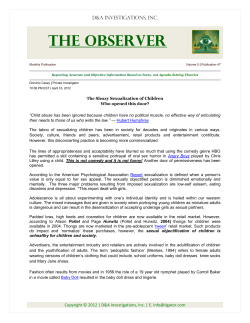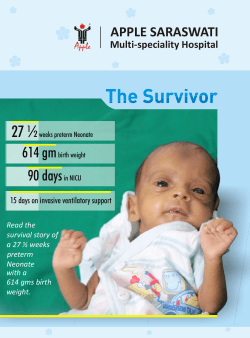
C hristian Parent Nonviolent
the Nonviolent hristian Parent C raising children with love, limits, and wisdom Christian Parenting Decisions dear parent Christian parents today face difficult decisions. Their hearts tell them that kind, gentle guidance is the Godly way to raise children; but other sources promote the idea that physical punishment is mandatory for righteous parenting. The interpretation of certain Old Testament verses causes further confusion, namely verses that seem to advocate striking children, leaving parents feeling torn between the merciful teachings of Jesus and the harsh instruction that accompanied the Mosaic Law. The ministry of Jesus Christ initiated a new beginning for mankind and a higher law for human interaction, children included. “As I have loved you, love one another.” (John 13:34) In Luke 17:2, Jesus taught that it would be better to” tie a millstone around your neck, and be cast into the sea, than to offend one of these little ones.” Inflicting physical pain or threatening to do so, is not only unnecessary, but is contrary to the way Jesus treated people. By sparing the rod and guiding your child, you can help them mature into self-disciplined, spiritually centered men and women. This pamphlet will walk you through the stages of child development, explaining the behaviors, needs and appropriate parental tasks for each stage. Included are tips for effective listening, understanding needs and feelings, and setting reasonable limits. When you learn together as parents an effective and respectful way of raising your children, you and your children benefit in many ways: c Your parental partnership, freed from disputes and rancor, becomes easier c You enjoy watching your offspring develop c You are planting healthy seeds in creating a lifelong loving family relationship. Blessings on your sacred job as parents, The Authors ..................................................................... When Your Baby Is Newborn to 8 Months* ..................................................................... Where your treasure is, there your heart will be also. matthew 6:21 your infant’s needs When you help your infant feel safe from falling, being hurt, feeling alone, and provide the basics of feeding, clothing, and diaper changing, you are showing daily your love for your child. You are setting the stage for the rest of your infant’s life. Make the connection to your baby your priority. you cannot spoil your baby by giving him too much attention c Comfort your baby whenever he cries. c Practice tenderness: stroke your baby’s face often and speak to her softly. Never yell. c Hold your little one when he is crying or demanding attention. c Tell your baby you love her; even before understanding words, the heart feels. c Never hit or shake your baby for he is fragile. * Ages given vary with each child’s development. ................................ 2 ................................ ..................................................................... When Your Baby Cries, She’s Asking for Your Help ..................................................................... The parental challenge in helping your child with eating, sleeping, and bathroom issues is to achieve the right balance between doing too much for them and being patient and helpful. your job as a parent is to: c Offer your baby the breast, a glass bottle, or pacifier. c Change your baby whenever her diaper is soiled or wet. c Check your baby’s clothes to see if she is too warm or cold. c Rock your baby, offering a toy for her if need be. c Walk with your baby, even outside if weather permits. c Dance or cuddle with your baby. c Sing softly to soothe your baby and yourself c Massage your baby, especially on the back. (This can help colic.) c Check to see if your baby has a fever, is tugging at his ear, or seems ill. c Check to see if your baby is teething. Look for swollen gums. c Often a car ride puts a crying baby to sleep. c Never touch your baby when you are angry or frustrated; calm yourself first. c If at your wit’s end, don’t hesitate to ask someone to take over. c Pray for your baby and the family. ................................ 3 ................................ ..................................................................... When Your Baby Is 8 to 12 Months ..................................................................... Let the little children come to me. mark 10:14 keep your baby safe You can expect your baby to have lots of energy, move about, touch and taste things, and explore. Babies learn and grow through these activities and through routines and rewards. This may require parents to make changes in their environment and life style. Your job is to make the home safe instead of trying to teach your child at this age. For instance, remove breakables from low shelves, keep medicines out of reach, cover outlet sockets, use baby gates on stairs and doorways, and put safety locks on cupboards, drawers and toilets. As your baby gets more active, let him know what’s okay and not okay by calmly saying words such as “stop” or “no,” then finding something else for him to do. You can also then read to her or sing to her. At this young age, distracting or redirecting attention is better and less frustrating than “teaching.” Yelling is frightening. Never shake or hit your child. ................................ 4 ................................ ..................................................................... When Your Child Is 1 to 2 Years ..................................................................... You can expect your child to become more independent, use some language, recognize names for objects, maybe start to test limits, sometimes resist sleeping or eating when he or she needs to, and probably throw temper tantrums. Also may begin showing interest in toilet training. your job as a parent is to help with: Sleeping, by sticking to regular routines of nap and bedtime, and doing quiet things before bedtime like reading, singing songs, cuddling, praying, and talking. Eating, by knowing that toddlers are often picky eaters and may change their tastes daily. This is very frustrating for parents. helpful meal hints c Feed different kinds of healthy food in small amounts. c Let her decide how much to eat. c Let him help in the kitchen. c Let her feed herself even if messy. c Don’t make him eat more; he might be full. c Keep calm at meal times. c Bring crayons, paper and small toys when eating out. c Don’t expect your toddler to sit through your whole meal. ................................ 5 ................................ ..................................................................... Tantrums ..................................................................... Blessed are the merciful, for they shall receive mercy. matthew 5:7 Tantrums can be normal for toddlers. Young children have them for many reasons like being tired, feeling out of control, over-stimulated, or wanting something they can’t have. General hints: Toddlers and preschoolers cannot regulate themselves because they don’t yet know their own limits. ways to deal with tantrums in public c Some children can’t deal well with crowded, noisy environments. If need be, take her home or to a quiet area to rest or have lunch. c Stay as calm as possible. Those around you will understand. c Do not yell, use harsh language, or threaten to spank or leave her. c Make sure she can’t get hurt or knock anything over. c Create a safe space for him to be a little apart. Talking is not helpful at this time. Give him a chance to calm down. help your child learn self-control Talk to her when she has calmed down. Tell her you feel disappointed sometimes too and know how hard it is to not get what you want. Let her know you didn’t like how she was acting, but you love her even then. ................................ 6 ................................ ..................................................................... When Your Child Is 2 to 3 Years ..................................................................... Children need the self-confidence that comes with meeting situations well. When you teach them appropriate action, they grow in self-esteem. you can expect your child to: c Say what he wants and feels, and argue and bargain with you. c Know when you really mean what you say. c Possibly say, “No” when meaning, “Yes.” c Struggle with becoming her own personality. c Maybe be ready for toilet training. (Don’t expect too much too soon.) your job as a parent is to: c Be clear and exact when you set limits. c Explain what you want in simple, positive words. c When stopping an unwanted behavior, also suggest a better behavior. For instance, if your child throws a toy truck, say that’s not okay, but it is okay to play with the truck on the floor. c Praise your child for things she does right, even if it is just sitting quietly. c Help your child know you love him with hugs, holding, and commenting on the good feelings he must get from his successes. ................................ 7 ................................ ..................................................................... Shaken Baby Syndrome ..................................................................... Parents need to know how harmful it is to shake a baby. Babies are hurt badly when they are shaken. This is called Shaken Baby Syndrome (SBS). It often happens when a parent or caregiver tries to make a baby or young child stop crying. The adult gets frustrated and shakes the baby. Shaking a baby can cause brain damage or even death. Babies and young children up to age 5 have weak neck muscles. The muscles cannot support the head very well. When a baby is shaken, the brain slams against the skull wall. This can be extremely dangerous. One out of four babies with Shaken Baby Syndrome die from it. A baby who is shaken can also have difficulty talking and have learning difficulties, get cerebral palsy, become blind, have seizures, or become mentally retarded. A spanking can sometimes produce a whiplash effect that creates Shaken Baby Syndrome. Never hit or shake your baby, and make sure you demand that anyone who takes care of your baby or young child does not shake, hit, or spank her either. Get care right away if your baby was shaken. It may keep your baby from having serious health problems. National Information, Support and Referral Service on Shaken Baby Syndrome (888) 273-0071 or www.capcenter.org ................................ 8 ................................ ..................................................................... Be a Model of Listening, and They’ll Learn to Listen ..................................................................... In everything do to others what you would have them do to you; for this is the law and the prophets. mathew 7:12 the three-step listening tool Mirroring what the other says. This means simply repeating in their words what they said, e.g.,“You really want to play with Johnny this afternoon.” Validating his thought, desire, or feeling, e.g.“That makes sense that you want that.” Too often we parents mock or shame our child’s desires or feelings. Naming the feeling they have, e.g.,“I guess you like Johnny and want to have fun with him.” Notice that being understood is the key ingredient here. For all of us, this is more important than being agreed with. This three-step tool ensures that will happen. But don’t worry that because you show you understand, you also have to agree with and allow the desire. Not true! But even if you can’t let him play with Johnny that afternoon, he will still feel understood and cared about. Giving real reasons rather than, “Because I said so,” makes a child feel that their desires are important and of value. As you become skilled at this form of listening, you will notice that your child feels understood and can more easily begin to acquire the self-discipline of not getting what he or she wants all the time. ................................ 9 ................................ ..................................................................... Discipline with Love and Consistency ..................................................................... I will show you who…hears my words and puts them into practice. He is like a man building a house, who dug down deep and laid the foundation on rock. luke 6:47 Discipline is teaching, not punishing; it is guiding children to learn to make good choices. It is educating them about self-respect and respect for others. Obtaining blind obedience is not discipline. Also, good parenting includes helping your child learn what he or she does right, and what can be learned from mistakes. The parent who learns how to set limits well is a parent who learns the difficult task of being consistent, which is time consuming, requires patience, self-confidence, and reminding yourself that firm love is good for your child. consistency helps your child: c Grow into a happy, healthy person with self-control. c Learn how to set her own limits, and accept no. c Increase self-esteem. c Learn appropriate ways of getting his needs met. c Feel safe and secure. lack of consistency trains your child to: c Manipulate and pit one parent against the other. c Argue relentlessly. c Feel unsafe and unparented. c Feel unfairly “picked on” and treated unfairly. ................................ 10 ................................ ..................................................................... Setting Limits, Using Two Kinds of Consequences ..................................................................... Natural consequences naturally follow our behavior, such as arriving late at the bus stop means the bus leaves without us. Logical consequences result from agreements broken. For adults these consequences can be lawsuits, traffic tickets, or jail time. For children, logical consequences follow from breaking family agreements, agreements that have been discussed and are well known. For instance, disrespectful language to a parent or a sibling receives a clearly understood consequence. how the good parent uses these two forms of consequences Allow natural consequences to take place, e.g. “You are so late in finishing your chores that now we don’t have time to shop for your tennis shoes.” The child will argue, and you will hold firm, and the consequence will take the heat, so to speak. Agree that certain logical consequences will occur when certain behaviors occur, e.g. for an older child might be,“So we all agree that calling anyone stupid results in writing five ways how your language might hurt them. Then you make sure the consequence is consistently given every time. Detailed information can be found for developing this skill in “Suggested Books and Websites” at the end of this booklet. ................................ 11 ................................ ..................................................................... A Note on Discipline ..................................................................... Fathers, do not provoke your children to anger, but bring them up in the discipline and instruction of the Lord. ephesians 6:4 Discipline is a crucial parental responsibility. Both testaments speak of it, and Jesus cautioned to never lead astray a child (Luke 17:2). The technique of using your listening skills in conjunction with good limit-setting practices makes you a star parent in helping your child learn self control and the art of making wise decisions. A good parent risks a child’s periodic unhappy states when consequences for misbehavior are being experienced. Don’t worry, a solid, long-term relationship with your grown-up child who remembers you cared enough to set limits will more than make up for the earlier struggles. a parent’s story Parenting with firm guidance instead of punishment requires that the parent, like the captain of a ship, keep a watchful eye for potential problems, nipping them in the bud before they become full-blown. My friends, on the other hand, would keep talking to one another and to me, ignoring what their children were doing until somebody got hurt, a big mess was made, something got broken, or things got entirely out of hand. Then came the screaming, the spanking, the crying, and other miseries I’d just as soon live without. teresa whitehurst in Jesus On Parenting: 10 Essential Principles That Will Transform Your Family ................................ 12 ................................ ..................................................................... How Your Child Develops a Conscience ..................................................................... Children go through five predictable stages forming their own conscience. It is important to know what you can expect and not place unreasonable demands on them. Stage One: 12 to 27 months The child thinks, “I want it, I’ll take it.” Babies can’t yet imagine the idea of consequences or feelings of others. Stage Two: 2 to 3 years The child thinks, “I would take it, but my parents will be upset with me.” The child sees that parents are big and supply all the goodies in life, so they don’t want to upset them. Stage Three: 3 to 5 years The child thinks, “I would take it, but my parents will find out.” The child is beginning to think things through and weigh risks. Stage Four: 6 to 7 years The child thinks, “I would take it, but if my parents find out, they would disapprove.” Or, “God would want me to make a better choice.” The child is now learning some internal control, is more connected to others, and is beginning to notice and care about how others would feel. The child now wants to please. Caution: Parents should not exploit this stage but rather help the child go on to the mature stage of acting because of internal values. Rather than emphasizing how pleased or proud you are, reflect to him how he must feel proud and happy about the action he took. Stage Five: 8 to 11 years The child thinks, “I want it, but I don’t feel good about doing things like that.” The child has begun to develop some internal control. His or her own moral values are developing based on healthy attachment to parents and through them to the greater society. He starts thinking of the interests of others as well as his own. ................................ 13 ................................ ..................................................................... When Your Child Is 3 to 11 Years ..................................................................... The way you treat your child determines how he or she will treat you. It also impacts whether or not he or she will talk openly with you as a teenager about such important issues as school, drugs, and sex. you can expect your child to: c Continue growing in language and understanding more complicated ideas. c Begin to imitate your moods, coping styles, and attitudes. c Cope with feelings and if helped, gradually learn to soothe herself when upset. c Negotiate for what he wants. c Begin peer relationships. c Start wanting to “fit in” or follow fads. c When older, make close friends. c Be increasingly influenced by the outside world and the media. c Want more independence the older she gets. your job as a parent is to: Listen c Take her concerns about day care or school seriously by following up on the full story. This does not mean ignoring any consequences her behavior creates. c Catch your child doing good things and tell her that you notice them. c Show her you love her by listening, touching, supporting, and paying attention. ................................ 14 ................................ Discipline c Set limits with love and consistency. c Monitor how much and what kind of tv he watches. c Listen to his music and discuss the lyrics as a teaching tool. c Remember your attitudes, choices, and behaviors are constantly teaching him. Teach and Play c Play with your child according to his terms for at least 15 minutes a day. c Let your child help you with cooking or chores. c Have fun with your child to keep a fresh relationship. c Help him recognize God’s hand in our world and in his life. ................................ 15 ................................ ..................................................................... When Your Child Is 12 to 15 Years ..................................................................... You are the Light of the World. matthew 5:14 you can expect your child to: c Argue more, be working on greater independence, feel awkward with his or her body, be dominated by peer relations. c Worry about being normal and accepted, have rapid physical growth, come into sexuality, have emotional upsets that may be hormonal. c Question family values, rules, and authority. your job as parent is still very important c Be available when she does intermittently want your attention. c Practice even greater listening skills to honor differences between you. c Apologize when you have been wrong or quick to judge. c Establish some time each week when you spend time together, just the two of you. c Ask about his day every day, and show interest without preaching. c Look for the “moments of openness” to give any advice. c Be clear and consistent about rules and agreements like using respectful language and reporting in. ................................ 16 ................................ ..................................................................... Being a Teenager Is Not Easy ..................................................................... Let the greatest among you become as the youngest, and the leader as one who serves. luke 22:26 Blessed are the peacemakers, for they will be called children of God. matthew 5:9 Parents who remember what it was like being a teen themselves will act with greater understanding and wisdom. Admitting to yourself that mistakes made as a teen were part of your own learning will help give balance to this potentially trying time for you and your teenage child. The Teen years can be a time of joy and awakening toward adult mental and spiritual capacities. If approached with respect and understanding, your time with your almost young adult can be a wonderful experience. ................................ 17 ................................ ..................................................................... When Your Child Is 16 to 21 Years ..................................................................... you can expect your young adult to: Be good at thinking for self and arguing a point, become involved with peers and romantic relationships, take on goals and pursue them, develop concern for others, struggle with place in life and future goals, possibly rebel against parents and toward later years, begin to quiet the rebellion. your job as a parent is to: Listen c Remain respectful toward son or daughter even during your struggles with them. c Have family meals to encourage sharing and a sense of family and support. c Balance respect for teen’s privacy with realistic need to know what’s going on with him or her. Insist on non-evasive answers and check things out. c Apologize when wrong or hasty. c Get to know your teen’s friends. c Know his daily activities. c Know that your child is still learning from your way of living life. c Show appreciation to your teen for good things you notice and help she gives. Discipline c Try to be home after school or arrange a realistic program to help keep healthy structure in your teen’s life. ................................ 18 ................................ c Stay consistent with consequences or family will feel out of control. c Adjust rules as age and maturity increase. Allow more freedom to encourage self-control and self-correction. c We all make mistakes; the goal is to learn from them. c Say, “ I love you” with words and actions. c Work as a partner with your child to set clear rules for such things as curfews, appropriate behavior, school attendance, homework, family obligations, drinking, sexuality, and motor vehicle safety as a passenger and as a driver. c Teens need boundaries to feel secure and will be more likely to have respect for rules they help to set. Teach and Play c Attend many of the special events in your child’s life (sports, plays, performances, graduations, etc.). c Encourage helping others in some organization like a church or community group. c Allow your young adult to direct you in one of his projects. c Find ways of having fun together. ................................ 19 ................................ ..................................................................... Warning for Parents with Teens ..................................................................... But the fruit of the spirit is love, joy, peace, longsuffering, gentleness, goodness, faith. galatians 5:22 Blessed are the peacemakers, for they will be called children of God. matthew 5:9 If drug abuse, illegal activities, anorexia, bulimia, depression, suicidal tendencies, or sexual activity are suspected, these things place your child’s life in danger, and your intervention is vital. Even if your child does not want your help, you may be required to step in to save their life. Be extra prayerful in these situations, as they are delicate and frightening. God can give parents strength to handle difficult situations. And do not hesitate to get reputable professional help! In spite of every righteous effort of parents to love and guide their children, some young people will choose a path that breaks their parent’s heart. Just as God does not give up on you, do not give up on your child. Continue to pray for them and to show your love unconditionally. Unconditional love is not the same as approving of their wrong behavior. If you have taught them the principles of Christian living, they will know what you stand for without you drilling it into them every time you are together. Patience is both essential and difficult at this time. A rejecting or punishing attitude will never bring them back. Only God and your love can do that. ................................ 20 ................................ ..................................................................... Christian Family Rituals ..................................................................... c Family meals together can begin with prayer. Even young children can learn to offer a simple prayer for the family. c Attend church together. c Teach children from the scriptures. Many families hold daily devotionals and find this a great help. c Do a family Christian service project. c Pray for your children that they be safe and make good choices. c Pray aloud as a family daily, discussing beforehand who and what needs to be included in the prayer. Let each family member have a turn every few days to be the voice for the family prayer. c Teach your child about Jesus, not in lectures, but by pointing out examples—words or behavior by a film character, or by your child, when they seem to follow Jesus’ teachings, e.g. the power of forgiveness or compassion. Do this only at “teachable moments,” and not constantly. c Encourage the notion of God’s perfect love as an ideal that we strive for but all fail at from time to time, even Mom and Dad, and that God forgives us and blesses our efforts. ................................ 21 ................................ ..................................................................... Be Kind to Yourself Also ..................................................................... So I say to you, ask, and it will be given you; seek, and you will find; knock, and it will be opened for you. For everyone who asks receives, and everyone who searches finds, and for everyone who knocks, the door will be opened. luke 11:9 Babies and young children warm our hearts and drive us crazy, embarrass us and make us proud. Because they so need our love and guidance, we sometimes try to be “perfect” and berate ourselves when we fail. But what’s essential is to keep your “eyes on the prize,” which is long-term spiritual growth and a strong, lasting connection between you. This will help you avoid the perfection trap wherein you forget that you have needs, too. While it’s easy to get caught in a sense of urgency—“gotta make this kid behave today!”—or anxiety—“I snapped at her again! She’s gonna hate me!” Remind yourself that when your children are young, you are constantly giving of your mind, heart, and physical stamina. Watch your own energy and stress level. Even the little things like skipping lunch, staying too long at the park, or trying to stay calm with the tv blaring can interfere with a parent’s good intentions. Remember when you pray for God’s blessings, that you are just as precious to God as your child is. When you tell your child that God never loses patience with them, remind yourself that this applies to you, too. Pray for guidance and know that you are not alone. ................................ 22 ................................ ..................................................................... Suggested Books and Websites ..................................................................... Jesus On Parenting: 10 Essential Principles That Will Transform Your Family teresa whitehurst, ph.d. A carefully integrated work helping you aspire and practice the virtues that the life of Jesus models concerning the service a parent performs in raising a child. Your Baby and Child: From Birth to Age Five penelope leach A well respected resource on what to expect and how to deal with issues from birth to Age Five. Parenting Young Children, and Parenting Teenagers don dinkmeyer and gary m c kay These are both excellent books that will help you understand your child’s behavior and learn to set limits with consequences. Very practical and easy to follow. How to Behave So Your Children Will, Too sal severe, ph.d. Severe is a school psychologist and seems to know how to be a firm parent without being an authoritarian or abusive one. Your Child’s Unique Temperament: Insights and Strategies for Responsive Parenting sandee graham m c clowry Available from Research Press at 1-800-519-2707. ................................ 23 ................................ Mothering Your Nursing Toddler norma jane bumgarner Wonderful help for this stage of development. Christlike Parenting dr. glenn i. latham This excellent book uses modern research along with Bible verses to teach people how to truly be Christ-like and loving in raising their children. www.gentlemothering.com A Christian Website about attachment parenting. How To Talk So Kids Will Listen, And Listen So Kids Will Talk adele faber and elaine mazlish This is excellent and practical about the title subjects. Plain Talk about Spanking jordan riak This pamphlet can be seen on line or ordered through www.nospank.net. This website is a complete reference for research concerning the dangers of spanking, shaking, and shaming as means to discipline children. www.Iamyourchild.org/Complete parenting kit up to age five Six videos and pamphlets, plus booklet that coaches parents in all aspects of parenting—feeding, sleeping, discipline, health, and safety. Cost $25 at www.Iamyourchild.org or 1-888-447-3400. Free to California parents by calling 1-800-kids025. This is highly recommended and gratefully used in creating this pamphlet. www.JesusontheFamily.org This is a very practical Christian site that allows readers to ask questions and receive answers about all ages of children’s lives. This pamphlet and other materials can be purchased there. ................................ 24 ................................ the authors Teresa Whitehurst, PhD, parent and author of Jesus On Parenting: 10 Essential Principles That Will Transform Your Family (Baker Books, 2003) is a licensed clinical psychologist who specializes in child, parenting, and family issues. Debbie Haskins, parent of 5, stepparent of 2, step grandparent of 4, Church teen and family leader, writer and activist. Al Crowell, MFT, parent and author of I’d Rather be Married: Finding your Future Spouse, and Love in the Trenches: A Couples Guide To Transforming the Power Struggle, has worked with couples and families for 20 years. endorsements My wife and I raised two daughters to responsible, Christian adulthood without using, or threatening, violence (spanking, paddling, whipping, shaking). It simply takes a different understanding of children and a solid commitment to positive discipline. I wholeheartedly endorse The Nonviolent Christian Parent as an excellent guideline for adults who wish to nurture their children in the name and spirit of Jesus Christ. the rev. dr. thomas e. sagendorf, united methodist pastor This short and readable pamphlet clearly explains what parents can expect in each growth stage of the child on into teenage years, and presents great tips for successful parenting. The references for further reading are also a great help. william sears, m.d., co-author of The Discipline Book Q& A about this booklet Q. Who is this pamphlet for? A. Every parent or future parent. Q. Is this information only for Christians? A. No. Though written with Christians in mind, it provides good, sound instruction for all parents. Q. Will this pamphlet help me if my child is already a teenager? A. Yes, it discusses children of all ages. Q. Why is spanking considered unacceptable as a form of discipline? A. Spanking damages a child’s sense that their parent is a safe person. It can create opportunity for serious abuse. It means more positive and effective methods of discipline are not being used. It can lower self-esteem. In some children it will lead to sexual intimacy problems later in life. Jesus did not instruct his followers to spank children. Q. Isn’t it risky to change parenting styles? Won’t my child become confused or act up if I stop spanking? A. No, as long as what you’re changing to is more positive and you are consistent in setting limits. Studies show that behavior improves when a child is treated with respect and lives free from the fear of physical punishment. Q. What can I say to my friends and relatives who don’t agree with my decision not to spank my child? A. Explain firmly that you have prayed about your decision and have chosen to act in a way that you feel is more conscientious, effective and positive for your family. Ask for their trust. Heated debates will accomplish nothing. A product of Christian Nonviolent Parenting. Read online or order more at http://nospank.net/cnpindex.htm
© Copyright 2025

